

Evidence based practice. Classroom management. Indigenous resources. Books and reading part 2. Reading difficulties eg dyslexia. Reading comprehension. Questioning. Literary geography. Podcasts. Citizen Science and other authentic learning opportunities. Coronavirus. Open access. Libraries, librarians, books and popular culture. Art and Library. Maths and library. Digital evolution of schooling. Library exhibition. Beginning teachers and mentoring. Feedback. Escape rooms. Social Media. Datasets. Pairing Picture Books and Primary Sources: America’s Champion Swimmer Gertrude Ederle by David A. Adler.
My students love athletes, but not just any athletes, the ones that are at the top of their game.
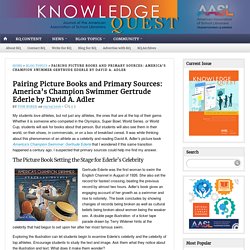
Whether it is someone who competed in the Olympics, Super Bowl, World Series, or World Cup, students will ask for books about that person. But students will also see them in their world, on their shoes, in commercials, or on a box of breakfast cereal. It was while thinking about this phenomenon of an athlete as a celebrity and reading David A. Adler’s picture book America’s Champion Swimmer: Gertrude Ederle that I wondered if this same transition happened a century ago. I suspected that primary sources could help me find my answer. The Picture Book Setting the Stage for Ederle’s Celebrity Gertrude Ederle was the first woman to swim the English Channel in August of 1926. Exploring the illustration can let students begin to examine Ederle’s celebrity and the celebrity of top athletes. Bridge Understanding of an Event through a Primary Source Analysis Evening Star, September 12, 1926.
Resources for English. Socratic discussion. Student Learning. The Future Belongs to the Curious: How Are We Bringing Curiosity Into School? What is curiosity?
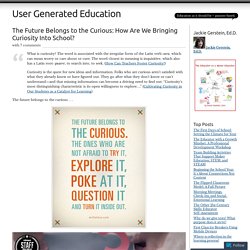
The word is associated with the irregular form of the Latin verb cura, which can mean worry or care about or cure. The word closest in meaning is inquisitive, which also has a Latin root: quaere, to search into, to seek. (How Can Teachers Foster Curiosity?) Curiosity is the quest for new ideas and information. Folks who are curious aren’t satisfied with what they already know or have figured out. The future belongs to the curious . . . Are You Prepared For The Future Of Social Learning? Are You Prepared For The Future Of Social Learning?
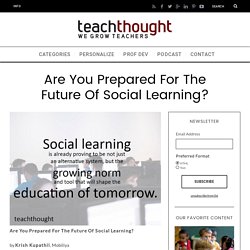
By Krish Kupathil, Mobiliya R = e –t/s where R is retention, T is time and S is strength. A formula detailing a chemical reaction, or the new math behind a social media outreach strategy? Actually, an expression of the ability to remember, discovered by the German psychologist Herman Ebbinghaus. Known as the famous Forgetting Curve, it hypothesized the decline of memory retention over time. With this statistic in mind, it is surprising that our formal education system –our schools, colleges and universities— has primarily relied on conventional learning methods to deliver information. Even with the growth of digital platforms such as online programs, the basic structure of learning remained the same; automation and technology simply enhanced the delivery methods.
Monday musings on Australian literature: Writer-in-residence programs. I’ve written before about Writers’ Retreats, which are sometimes framed as writer-in-residence programs.
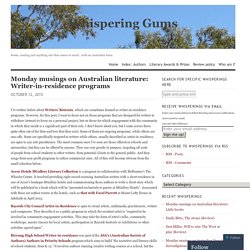
However, for this post, I want to focus not on those programs that are designed for writers to withdraw (retreat) to focus on a personal project, but on those for which engagement with the community in which they reside is a significant part of their role. I don’t know about you, but I come across these quite often out of the blue and love that they exist. Some of them are ongoing programs, while others are one-offs.
Must READ. Student data. QUOTES. Leading literacy across the curriculum. Augmented Reality. Flipped Classroom. Curation. Evidence based practise. PLP - Personalised Learning Plans. ANZAC. Gamification. Book Sculptures: The Full Set. Writing. About Libraries. Teaching for Inclusion - Teaching for Inclusion. 2014-nmc-horizon-report-k12-EN.pdf.
Digital Citizenship. Digital teaching resources. Video. Copyright. DEC policies, procedures and links. Other libraries. Library management and planning. TL blogs and boards. TL associations. Dictionaries/Thesaurus. Connected classroom. Information literacy. SAMR, STEM, Guided Inquiry. Australian Curriculum.
About the author : Nightskyonline.info. This website is maintained by Paul Floyd.
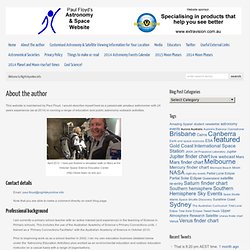
I would describe myself best as a passionate amateur astronomer with 24 years experience (as at 2014) in running a range of education and public astronomy outreach activities. April 2012: I have just finished a simulated walk on Mars at the Victorian Space Science Education Center ( Contact details Email: paul.floyd@nightskyonline.info Note that you are able to make a comment directly on each blog page. Professional background I am currently a primary school teacher with an active interest (and experience) in the teaching of Science in Primary schools. Prior to beginning work as as a school teacher in 2002, I ran my own education business (detailed below under the ‘Astronomy Education Activities) plus worked as an environmental education and outdoor education instructor on a casual basis with a range of organisations.
I have two separate degrees – one in recreation management in planning and a second in primary teaching. World Wide Web Outreach. Free Fonts - I Shot the Serif. Esa.edu.au.
Journals and Databases. Books and reading. Discovery. Physical space - Library design and renovation. Oasis. Study skills. Library events. Makerspace.